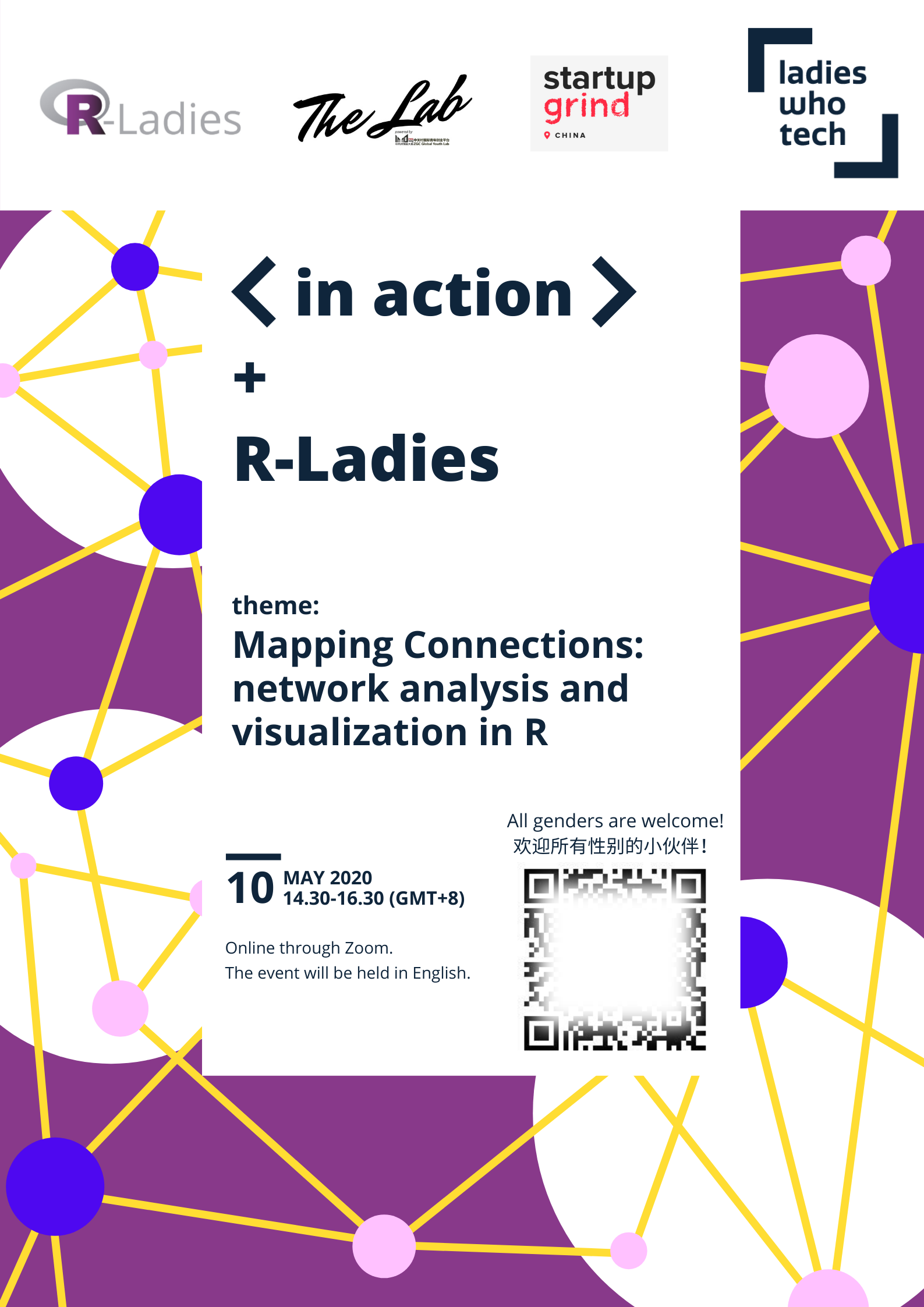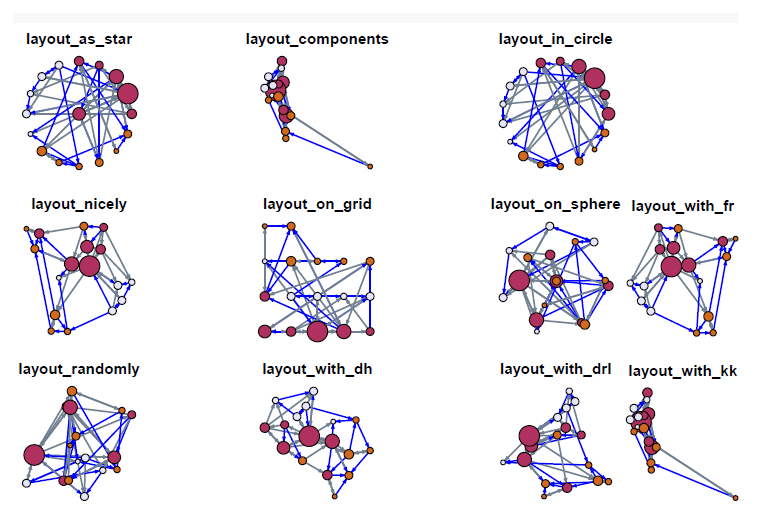On May 10, International Mother’s Day, Yenching Scholars Hannah Kirk, Clara Wang, and Michelle Kan organised a joint online R-coding tutorial outreach. A collaboration between their respective organisations, R-Ladies Beijing and Ladies Who Tech, the online tutorial is the first of several online coding outreach efforts planned by the two organisations.
Hannah and Clara, who re-founded the Beijing chapter of R-Ladies this past autumn after it had fallen dormant, organised the tutorial. R-Ladies provides R-coding outreach opportunities, such as tutorials and workshops, to women, girls, and allies of female empowerment and education. The May 10 workshop was aimed at continuing coding outreach and education online for beginning and intermediate R learners. Hannah taught the tutorial, while Clara coordinated tasks between the participating organisations, which also included Startup Grind Beijing and the Lab at Innoway, in addition to sorting out event logistics.

The two scholars were joined by their classmate Michelle Kan and other participants from Ladies Who Tech, a Beijing-based organisation that seeks to level the playing field for women in STEM industries and discover their full potential by hosting professional development workshops, networking sessions, and speaker series. The R-coding collaborative workshop organised between R-Ladies and Ladies Who Tech also happened to be the first professional skills workshop co-hosted by Ladies Who Tech.
Michelle, who has had previous experience in graphic and promotional design, now creates promotional materials for Ladies Who Tech. She noted, “Both R-Ladies and Ladies Who Tech share a similar idea, which is that we ought to support women in the tech industry, which tends to be very male-dominated. Although this was our first skills workshop, it very much was in tune with our mission of empowering women in STEM industries.”
The two hour-long tutorial, in which Hannah taught 60 participants, focused on the use of R-coding to analyse network data and plot connections, covering a broad variety of relationships between different actors in various networks, ranging from links between social media users and citations between academic researchers to global flight connections. The tutorial demonstrated how R-coding could be employed to visualise such global networks. Regarding the online format, Hannah commented, “Just because there’s a pandemic going on doesn’t mean that education and tech opportunities for women should be on pause. I really enjoyed teaching to a really dynamic, ambitious, and diverse community.” Clara commented, “Hannah did a really great job designing a tutorial that was engaging and easily digestible. We also got a lot of new members in the R-Ladies WeChat group, which was a great outcome as we’re hoping to grow the R-Ladies Beijing community.”
Speaking on how she became involved in coding and outreach, Clara reflected on discussions at her previous workplace. “I first learnt R-coding during my undergraduate studies at Dartmouth and used it almost everyday working as an applied data scientist at Civis Analytics for two years. Civis has actively worked to rephrase job descriptions and adjust the work culture so it was more accepting of all types of people. One of my co-workers at Civis was also good friends with the founder of R-Ladies Chicago, and I attended a few of their events and was really inspired by their mission. I knew when I came to Yenching that I still wanted to be involved with R-Ladies and gender advocacy in tech.” Hannah added, “Having worked in several tech jobs myself, I understand there is a severe lack of gender equality in the coding field. R-Ladies in particular wants to reiterate that anyone - girls, mothers - can learn how to code, and dispel stereotypes that women can’t code.”

Hannah and Clara, who are also co-founders of the Yenching Data Science and Tech Club, have both previously led R-coding tutorials on campus at Yenching’s Jingyuan classroom building. Clara also previously led an R-Ladies event in December in partnership with Ladies Who Tech, Startup Grind Beijing, and the Lab at Innoway.
Hannah explained her own approach to coding in the frame of learning a language: “I once thought that coding was this dry functional thing, but then I had a Eureka moment when I realised what a creative medium it is to convey and visualize an argument. Although I learnt coding through self-study and textbooks and websites, I would like other people not to go through the same pain, so tutorials are a way to give back.” On her approach to coding outreach, Hannah added, “I want to make sure that coding is accessible. It’s like learning a language, and once you get the ball rolling, you’re using this language to create a picture that can encapsulate the immense amount of data being produced to help your viewer and yourself make sense of it. It’s an incredibly useful skill in academic job positions - it helps you not only go further in research and automate repetitive tasks, but it also helps you convey your information in a visually pleasing way that takes up less space than words. Coding is a friend who will hold your hand and clarify everything.” On her own approach to coding, Clara commented, “Coding always seems like solving a puzzle to me, which I really enjoy. I think my prior work experience working with other people on coding projects has taught me the value of collaboration, since everyone has their own way of writing code. You can learn a lot from just looking at other people’s code, even if you’ve been writing code for years.”

Led by the Yenching Scholars, R-Ladies Beijing and Ladies in Tech have two more workshops planned for June. The next will teach supervised machine learning for regression and classification, while the one after will focus on building and deploying recommender systems, which was also the topic of Hannah’s recently defended Yenching thesis. Hannah, who will begin her Ph.D at Oxford in the autumn, plans to join the Oxford chapter of R-Ladies and continue delivering tutorials to Chinese R learners with Clara, who will continue to lead the Beijing chapter. Clara hopes to attract more people who want to become R community organisers: “I want to organise some R-Ladies events where the primary language is Chinese and engage more with local businesses, organisations, and schools. We are really lucky to have our existing partnerships with Ladies Who Tech, Startup Grind, and the Lab and Innoway, and I think it’d be great to form even more partnerships.”